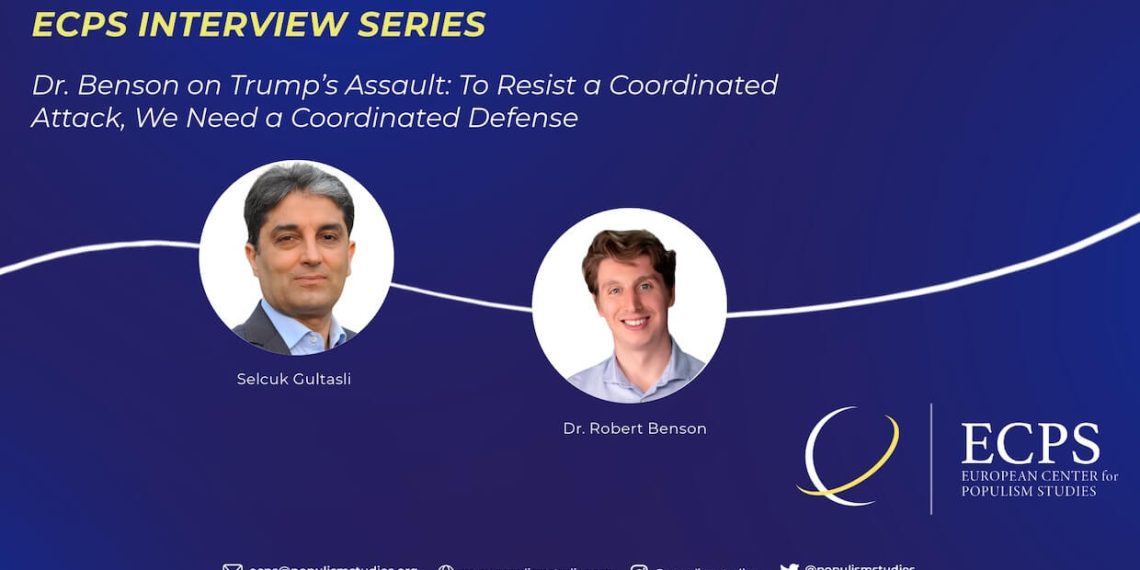On the 100th day of Trump’s second term, ECPS sat down with Dr. Robert Benson of the Center for American Progress to dissect the anatomy of democratic backsliding. In this wide-ranging interview, Dr. Benson warns of a “coordinated assault” on American civil society and urges a “coordinated defense” in response. Drawing comparisons with Turkey and Hungary, he highlights the early stages of authoritarian consolidation and calls for a “whole-of-society” mobilization. “We’re moving faster in the United States than the AKP ever moved in Turkey,” he cautions. From institutional capture to international instability, Dr. Benson’s insights are a timely wake-up call. “Authoritarians have coordinated,” he says—“now it’s time for democrats to do the same.”
Interview by Selcuk Gultasli
Marking the 100th day of Donald Trump’s second administration, the European Center for Populism Studies (ECPS) sat down with Dr. Robert Benson, Associate Director for National Security and International Policy at the Center for American Progress (CAP), to discuss one of the most urgent questions of our time: how democracies can defend themselves against coordinated authoritarian assaults. Drawing on comparative insights from Hungary, Turkey, and the United States, Dr. Benson offers a sobering but clarifying analysis of democratic backsliding and populist autocratization.
“This is truly a critical question,” Dr. Benson begins. “We must understand the timeline and scope of democratic backsliding.” While emphasizing the uniqueness of national contexts, he identifies recurring “red flags,” notably the failure of institutions and elites to respond decisively during what he calls the “early window”—the critical phase before authoritarians consolidate power. In the US case, Dr. Benson critiques what he calls a “politics of respectability” within the Democratic Party—an adherence to procedural norms long after the opposing party has abandoned them.
In an increasingly polarized and factionalized America, Dr. Benson warns of the systematic targeting of democratic institutions across civil society. Citing the German term Gleichschaltung—the 1930s strategy of coordinated authoritarian control—he stresses the need for a similarly coordinated democratic defense. “You target them all at once, and they fold,” he says of authoritarian strategy. “So how do we respond effectively? We need to build alliances… Business, universities, media—need to begin communicating with one another.”
Perhaps most striking is Dr. Benson’s comparison between institutional capture in Turkey and current trends in the US, where he argues the pace of democratic erosion is even faster. “We’re moving faster in the United States than the AKP ever moved in Turkey,” he warns. His call to action is clear: without “whole-of-society” mobilization that extends beyond coastal elites and engages Middle America, resistance risks fragmentation.
Dr. Benson does not limit his concern to domestic threats. He sees Trump’s foreign policy and suspension of military aid to Ukraine as emblematic of a broader unraveling of the post-1945 liberal order. “This is a complete victory for Vladimir Putin,” he states bluntly. From global alliances to civil liberties at home, the consequences are profound.
Yet amid the gravity of his analysis, Dr. Benson also sees opportunity—particularly in building transnational democratic networks. “Authoritarians have done a better job at coordinating,” he admits. “But that can change—if democratic actors start sharing tactics, intelligence, and, most importantly, a common purpose.”
The interview with Dr. Benson is a call to strategic clarity—and a coordinated democratic defense.


